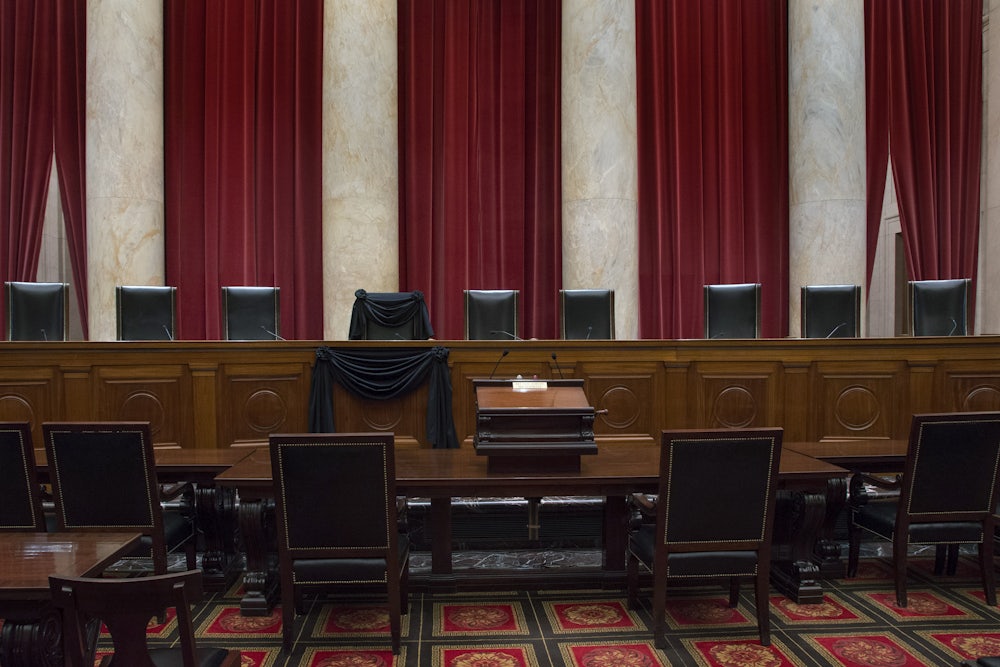In the wake of Antonin Scalia’s death earlier this month, many observers of the Supreme Court have argued that, for better or worse, he strongly influenced the Court by putting originalist constitutional interpretation at the center of its deliberations.
“With Scalia on the bench, academics, lawyers, and jurists left, right, and center were forced to confront originalist theory,” wrote the constitutional lawyers David B. Rivkin Jr. and Lee A. Casey. “Justice Scalia did more than perhaps any judge of his generation to move the Supreme Court toward originalism in constitutional interpretation,” argued the brilliant legal scholar Jack Balkin, whose constitutional approach uses originalism for progressive ends. “[T]he movement Scalia helped unleash has been attempting to push his originalism further than ever before,” asserted the political scientist Amanda Hollis-Brusky, author of a superb new book about the conservative Federalist Society.
Hollis-Brusky is certainly correct that the conservative constitutional principles advanced by Scalia and the Federalist Society alike will endure, and that future Republican Supreme Court nominees are likely to be even more reactionary than Scalia. What is up for debate is whether these judges are likely to make frequent use of originalism—the theory that holds judges should ascertain the original intent of the Constitution’s framers—and whether it will really matter if they do or not.
My guess is that it will not. Originalism is already a relatively marginal force in the Supreme Court’s constitutional interpretation. And, more importantly, originalism doesn’t meaningfully drive judicial decision-making even when judges nominally use it.
To some scholars, originalism now dominates constitutional discourse on both the left and right, in large measure because of Scalia. As the political theorist Corey Robin put it, “Where yesterday’s generation of constitutional scholars looked to philosophy … to interpret the Constitution, today’s looks to history, to the moment when a word or passage became part of the text and acquired its meaning. Not just on the right, but also on the left.” Arguments about the broad influence of Scalia’s purported originalism often focus on District of Columbia v. Heller, the landmark Second Amendment opinion that Scalia authored. This is because both Scalia and Justice John Paul Stevens, in his dissent, primarily used historical arguments to justify their outcomes.
But such debates about history are nothing new. On the New Deal Court, for example, Felix Frankfurter and Hugo Black engaged in a running historical debate about whether the Fourteenth Amendment required the provisions of the Bill of Rights to be applied to state governments. Frankfurter concluded that the Bill of Rights was not applicable, and that the Due Process clause should be applied to the states on a case-by-case basis. Black concluded that the Bill of Rights was fully binding on the states.
Frankfurter and Black ended up where they ended up, for the most part, irrespective of where the history might have led them. Frankfurter was consistently skeptical that the Court should take an active role in protecting civil liberties, and preferred minimalist, case-by-case decision-making. Black believed the Court should be more interventionist, and (like Scalia, from the other ideological direction) generally preferred clear rules to balancing tests. Frankfurter’s views were primarily motivated by his opposition to the activism of the conservative Supreme Courts of the twentieth century, not his historical understanding of constitutional provisions. And for all of Black’s labors in the Library of Congress, his libertarian views of free speech were a distinctly twentieth-century innovation, bearing little resemblance to how free speech was generally understood at the time of the ratification of the First Amendment.
Heller is precisely analogous. The vote on the case broke down precisely on expected ideological lines. What grand theory the majority and dissenting opinions used to justify their conclusions is not terribly important. Before and after Scalia, justices will use history when they believe it supports their ex ante conclusions and ignore it when they believe it doesn’t.
And, of course, Scalia himself was far from a consistent originalist. As Heller shows, history is often indeterminate, providing adequate evidence for both sides of a debate. And in cases where historical evidence might be inconsistent with his cherished political views, Scalia would simply ignore it. It is farcical to argue that the Due Process Clause of the Fifth Amendment was originally understood in 1789 as forbidding all racial classifications. This didn’t stop Scalia from finding that federal affirmative action programs were categorically unconstitutional because they classified people by race, with a conclusory two-paragraph opinion that says nothing about the history of the Fifth Amendment.
Another important point to be made about Heller is that its focus on historical evidence is more the exception than the rule on the Roberts Court. Landmark opinions in areas like school desegregation, voting rights, and campaign finance have been sparing to non-existent in their use of historical evidence. One reason for this is that neither of George W. Bush’s nominees, John Roberts and Samuel Alito, have shown any interest in originalism or any other grand constitutional theory. As the law professor Eric Posner observes, of the remaining justices only Clarence Thomas even considers himself an originalist.
I welcome the relative candor of Alito and Roberts. No grand theory constrains or explains judicial decision-making. Whether the next Supreme Court justice is appointed by a Republican or Democratic president matters a great deal, because Supreme Court justices tend to reliably reflect the constitutional values of the president that appointed them. How often the next justice justifies his or her decisions using historical evidence, conversely, is of trivial importance.
For further discussion of how Scalia shaped originalism, we recommend this episode of the New Republic’s politics podcast, Primary Concerns:
